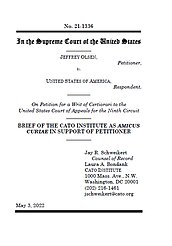Learn more about Cato’s Amicus Briefs Program.
In 2017, Jeffrey Olsen was indicted in the Federal Court for the Central District of California for unlawfully distributing opioids. After over three years of continuances, Mr. Olsen was finally set to go to trial on October 13, 2020; however, months earlier, the Central District of California had ordered the suspension of all jury trials due to the COVID-19 pandemic. Unsurprisingly, the government sought a continuance of the October 13, 2020 trial based on the this suspension. Not wanting to wait any longer, Mr. Olsen invoked his right to a speedy trial pursuant to the Sixth Amendment and the Speedy Trial Act of 1974.
The District Court agreed that Mr. Olsen’s speedy trial rights had been violated and dismissed the indictment. In its opinion, the District Court found that a continuance under the Speedy Trial Act’s “ends-of-justice” provision was not appropriate because the pandemic did not make it impossible to proceed with trial. In support of this position, the court pointed out that grand juries had convened and issued 41 indictments from the Central District of California’s courthouse between June and September 2020. Moreover, California state courts had resumed jury trials, including the state courthouse located across the street. Ultimately, the District Court held that the local order suspending jury trials was insufficient to overcome the requirements of the Speedy Trial Act, and therefore, the only option was dismissal.
The Ninth Circuit disagreed, vacated the dismissal of Mr. Olsen’s indictment, and remanded the case back to District Court for further proceedings. Mr. Olsen appealed to the Supreme Court. Cato has filed an amicus brief in support, arguing that the Ninth’s Circuit’s opinion will have a widespread negative impact on the Speedy Trial Act and the Sixth Amendment speedy trial guarantee.
The right to a trial by jury is guaranteed by Article III of the Constitution, the Sixth Amendment, and the constitutions of all fifty states. The Constitution provides for the right to a jury trial generally, while also establishing a framework for criminal procedure through the Fifth and Sixth Amendments. One such procedural guarantee contained within the Sixth Amendment is the right to a speedy trial. Understanding the importance of a speedy trial, Congress enacted the Speedy Trial Act of 1974, which sets specific deadlines by which courts must fully adjudicate criminal cases. But the Ninth Circuit’s opinion strikes at the heart of this guarantee by allowing courts to indefinitely delay jury trials based on local orders and alleged safety concerns.
The Ninth Circuit’s evisceration of the Speedy Trial Act, if allowed to stand, will also contribute to the growing erasure of the jury trial more generally. Although the jury trial was intended to act as the central pillar of the American justice system, trials have all but disappeared from American courtrooms—in 2021, 98.3 % of federal criminal convictions resulted from guilty pleas, rather than jury verdicts. There is ample reason to doubt whether the bulk of these pleas are truly voluntary, as prosecutors can employ a wide array of tools to effectively coerce defendants into pleading guilty. One of the most powerful of those tools is the crushing burden of lengthy pretrial detention, which the Sixth Amendment and the Speedy Trial Act were meant to guard against. By rendering the speedy trial guarantee hollow and ineffective, the Ninth Circuit’s decision in this case will exacerbate what is already an urgent crisis in our system of criminal adjudication.

This work is licensed under a Creative Commons Attribution-NonCommercial-ShareAlike 4.0 International License.

